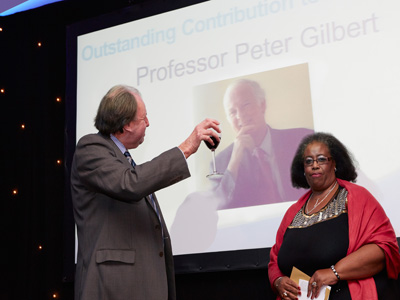
Worcestershire’s former social services director Peter Gilbert has been recognised for his outstanding contribution to the profession at the Social Worker of the Year Awards 2013.
Gilbert won the Outstanding Contribution award in recognition of his sizeable influence on social work thinking on mental health, learning disabilities, spirituality and leadership.
Professor Ray Jones, a trustee of Social Worker of the Year Awards, said: “At a time when we’ve all been asked to focus much more on performance indicators and data, Peter always reminded us that what is also important is the personal contribution we make as people and that’s important for those who are marginalised.”
Gilbert entered social work after serving in the Army and went onto become the director of operations at Staffordshire Council and, later, director of social services at Worcestershire Council.
Widely viewed as an expert on the topics of learning disabilities and mental health, Gilbert also held numerous high-level positions within the profession through which he has had a considerable impact on the development of guidance, practice, social work theory and policy.
These many posts included being a national facilitator of the National Social Care Strategic Network, chair of the National Development Team for Inclusion, emeritus professor of social work and spirituality at Staffordshire University, and joint fellow for mental health at NICE and SCIE.
Throughout his career Gilbert has been willing to champion what he believed was important regardless of mainstream thinking within the profession.
“One of Peter’s big contributions is, at a time when it was not quite so fashionable, he was a strong advocate and champion within the field of mental health and gave that a high-profile in both the organisations in which he was working but also through the British Association of Social Workers,” says Jones.
His contribution to social work thinking on mental health was further aided by his willingness to speak and write openly about his own personal experience of depression.
Gilbert’s courage in challenging the status quo is also reflected in his work on the issue of spirituality in social work. Believing that social work’s origins in Freudian and Marxist thinking had made the profession suspicious of religion and faith, Gilbert – himself a Roman Catholic – advocated a vision of social work that recognised the benefits that spirituality, in its broadest sense, could bring to social care practice.
“Peter’s ability to transmit what spirituality means lies in his disarming honesty about his own need for spiritual help in his life; his prodigious and generous networking skills and his charm, warmth and kindness towards those who meet him,” says Dr Janice Clarke, senior lecturer at the University of Worcester.
“His own experiences led him to an acute awareenss of the importance of humane and spiritual leadership, which comes across in his teaching and speaking, capturing the minds and hearts of students. I, and many others, have reason to be grateful to Peter for his passion.”
Gilbert also wrote many books about social work practice including Managing to Care with Terry Scragg in 1992 and, most recently, Spirituality and End of Life Care.
“Peter is a man of tremendous integrity and considerable energy and commitment, but at the end of the day he has always been someone who related to people very well and is a very human person,” says Jones.


 Assistive technology and dementia: practice tips
Assistive technology and dementia: practice tips  A trauma-informed approach to social work: practice tips
A trauma-informed approach to social work: practice tips 




 Find out how to develop your emotional resilience with our free downloadable guide
Find out how to develop your emotional resilience with our free downloadable guide  Develop your social work career with Community Care’s Careers and Training Guide
Develop your social work career with Community Care’s Careers and Training Guide  ‘Dear Sajid Javid: please end the inappropriate detention of autistic people and those with learning disabilities’
‘Dear Sajid Javid: please end the inappropriate detention of autistic people and those with learning disabilities’ Ofsted calls for power to scrutinise children’s home groups
Ofsted calls for power to scrutinise children’s home groups Seven in eight commissioners paying below ‘minimum rate for home care’
Seven in eight commissioners paying below ‘minimum rate for home care’
 Facebook
Facebook X
X LinkedIn
LinkedIn Instagram
Instagram
Comments are closed.